Premium Only Content
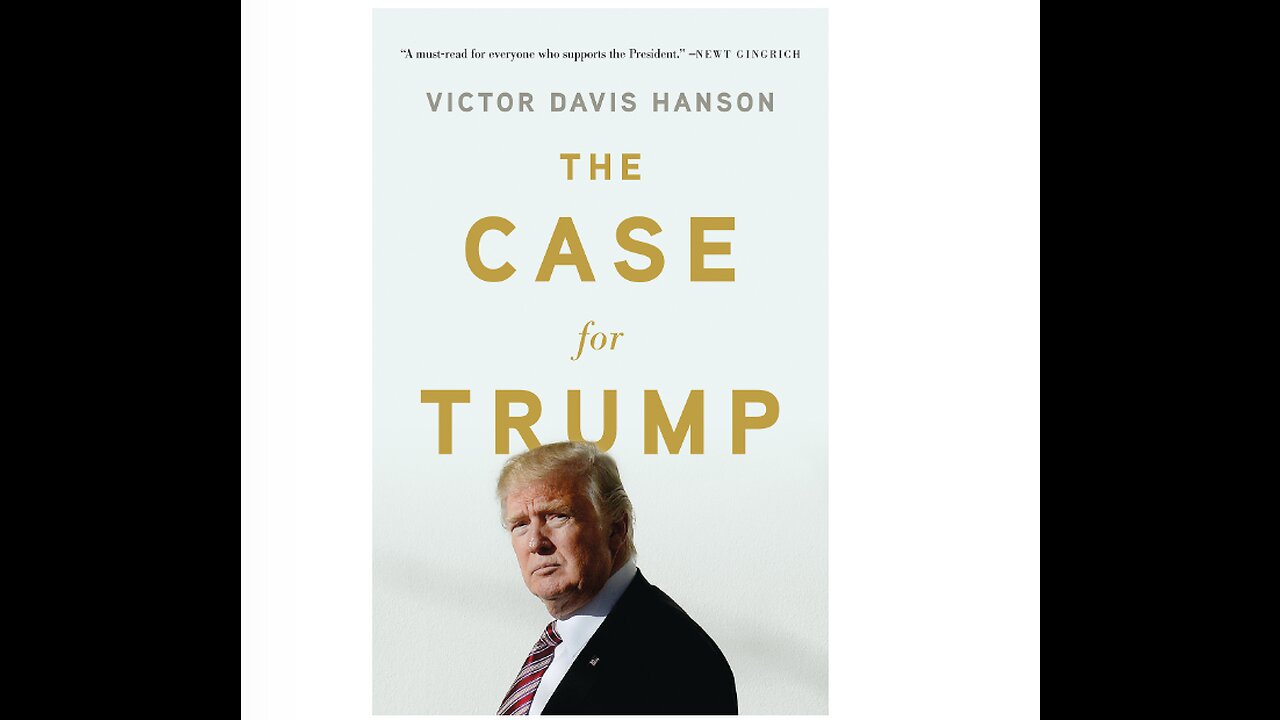
The case for Trump Victor Davis Hanson. 2019 a Puke(TM) Audiobook
The case for Trump
Victor Davis Hanson.
Copyright 2019 by Victor Davis Hanson
Library of Congress Control Number: 2018968200
ISBN 978-1-5416-7354-0 (hardcover),
ISBN 978-1-5416-7353-3 (ebook)
ABOUT THE AUTHOR.
Victor Davis Hanson is the Martin and Illie Anderson senior fellow in classics and military history at the Hoover Institution, Stanford University, and a professor emeritus of classics at California State University, Fresno. He is the author of more than two dozen books, ranging in topics from ancient Greece to modern America, most recently The Second World Wars: How the First Global Conflict Was Fought and Won. He lives in Selma, California.
PREFACE.
The Case for Trump explains why Donald J. Trump won the 2016 election, and why I and 62,984,827 other Americans, 46 percent of the popular vote, supported him on Election Day. I also hope readers of the book will learn why Trump’s critics increasingly despise rather than just oppose him. Often their venom reveals as much about themselves and their visions for the country as it does about their opposition to the actual record of governance of the mercurial Trump.
Donald Trump ran as an abject outsider. He is now our first American president without either prior political or military experience. Frustrated voters in 2016 saw that unique absence of a political résumé as a plus, not a drawback, and so elected a candidate deemed to have no chance of becoming president.
The near-septuagenarian billionaire candidate, unlike his rivals in the primaries, did not need any money, and had little requirement in the primaries to raise any from others. Name recognition was no problem. He already was famous, or rather notorious. He took risks, given that he did not care whether the coastal elite hated his guts. These realities unexpectedly proved advantages, given that much of the country instead wanted someone, perhaps almost anyone, to ride in and fix things that compromised political professionals would not dare do. With Trump, anything was now felt by his backers to be doable. His sometimes scary message was that what could not be fixed could be dismantled.
Introduction.
MEET DONALD J. TRUMP.
Ordinary men usually manage public affairs better than their more gifted fellows.
Thucydides, History of the Peloponnesian War, spoken by Cleon, son of Cleaenetus.
On June 16, 2015, voters met sixty-nine-year-old flamboyant billionaire, and now Republican presidential candidate, Donald J. Trump at his own eponymous Manhattan high-rise.
The outsider offered no apologies for promising to be the first successful presidential candidate to have no political experience. Trump came down on his escalator, ready for the beginning of a nonending war with the press and civil strife within his party. He postured like Caesar easily crossing the forbidden Rubicon and forcing an end to the old politics as usual.
Trump arrived with few if any campaign handlers. He soon bragged that he preferred an unorthodox small staff to ensure immunity from political contamination altogether. He boasted that he would pay for his own campaign. “I’m using my own money. I’m not using the lobbyists. I’m not using donors. I don’t care. I’m really rich.”
But if the legendarily parsimonious billionaire planned to use mostly his own funds, then he was likely to run the most outspent presidential campaign in history. Sure enough, by Election Day, Hillary Clinton would raise almost half a billion dollars more than Donald Trump’s roughly 600 million dollars and still lose the Electoral College vote. Trump seemed oddly naïve about the reality that in presidential politics the rub is not so much about having lots of your own money, but rather the ability to get lots more of other people’s money.
What followed was the strangest presidential candidate’s announcement speech in memory. Trump’s stream-of-consciousness talk went on and off, and back on, script. Reporters were stunned but also mesmerized by his lowbrow, sometimes crude tone and its content.
Chapter Two.
TRUMPISM.
A civil war is going to break out inside the Republican Party along the old trench lines of the Goldwater-Rockefeller wars of the 1960s, a war for the heart and soul and future of the party.
Patrick J. Buchanan, Where the Right Went Wrong.
To leverage the cultural and class divide, to win the Republican primaries and to fuel a general election bid, Trump zoomed in on a number of signature issues. All of them at various times had been the haphazard property of earlier right-wing and, on occasion, left-wing populists. But from the moment that Trump announced his candidacy, he monotonously hammered these concerns, as if they were uniquely novel and his own throughout the campaign, the presidential transition, and his first two years in office.
Even more unusual, what Trump ran on in 2015 to 16, he almost immediately sought to implement as president in 2017 to 18. That consistency rallied his base. It also astonished his critics, who privately had consoled themselves after his victory along the lines of “at least Trump cannot be serious.”
But he was. And he made that clear with a number of agendas.
Candidate and then president Trump faulted Bush’s Republicans as much as Obama’s Democrats for optional, costly, and inconsequential wars, from Iraq to Libya. For Trump, the objection was not that intervening abroad was necessarily immoral. Rather, such interventions were allegedly fought for ungrateful others, at the expense of Americans at home, especially the working classes. In political terms, Trump decided to run against much of the current Washington bipartisan foreign policy establishment and the previous three administrations that had intervened in Afghanistan, Iraq, and Libya.
When Trump serially complained, “We don’t win wars anymore,” he did not mean just that the United States should be more muscular in finishing conflicts. Specifically, America should fight more reactively than preemptively, but only where America can realistically win. “Well, I’ll tell you what, I don’t mind fighting,” Trump conceded in February 2016, “but you have got to win and number one, we don’t win wars, we just fight, we just fight. It’s like a big, like you’re vomiting, just fight, fight, fight.”
Chapter Three.
“MODERN DAY PRESIDENTIAL”.
I saw that Philip himself, with whom our conflict lay, for the sake of empire and absolute power had had his eye knocked out, his collar-bone broken, his hand and his leg maimed, and was ready to resign any part of his body that Fortune chose to take from him, provided that with what remained he might live in honor and glory.
Demosthenes, On the Crown.
We have seen that Trump fixated on a preexisting and receptive swing-state constituency. Then he crafted the right issues both to fire it up and yet also to transcend it. There is, however, still something missing in the decipherment of the Trump enigma. It is unlikely that any other politician could have followed the winning Trump formula (or would have proven as president so chaotically conservative had he been elected).
In other words, Trump the person, warts and all, vulgar, uncouth, divisive, and yet often empathetic and concerned, despite or because of his storied past, must explain much of his rise to power. Trump the person, then, transcended his issues. How and why Trump overshadowed his ideas and won the Republican nomination and election is the subject of this chapter.
Apparently, a third of the voters saw him as something analogous to chemotherapy, which after all is used to combat something far worse than itself. Such toxicity was felt to be needed to kill the cancer, meaning the politics and bureaucracy of the proverbial deep state, even as the dosage might nearly kill the patient (the Trump voter) during the taxing therapy (the 24-7 media obsession with all things Trump). Trump supporters certainly did not want another palliative of McCain or Romney aspirin. And they no longer believed that a more conservative-sounding version of House Speaker Paul Ryan would be a successful substitute for the current Paul Ryan.
Chapter Four.
DEMOCRATIC TRIBALISM.
There exists also in the human heart a depraved taste for equality, which impels the weak to attempt to lower the powerful to their own level, and reduces men to prefer equality in slavery to inequality with freedom.
Alexis de Tocqueville, Democracy in America.
In 2016, Hillary Clinton spent a record 250 million dollars in negative advertising against Donald Trump to paint him as a sexual predator, a colluder with Vladimir Putin, a tax cheat, a dishonest developer, a bigot, an alt-right racist, a xenophobe, a dark populist, a neofascist, a Machiavellian manipulator, a nut who might blow up the world, or alternatively a buffoon, a joke, a mess, and a slob. Hillary’s main message was “I am not the ogre Trump!”
Yet running just against a presidential candidate’s person, rather than his ideas, his agendas, and his party, has not usually worked in recent American history. Walter Mondale was a charismatic, progressive, well-informed former senator and vice president when he ran in 1984 against incumbent Ronald Reagan. Yet Mondale offered only a vague liberal agenda. Instead, he defined his campaign mostly as against Reagan, the supposedly heartless rich man’s lackey and ill-informed bumbler abroad.
When the economy grew at over an annualized rate of 7 percent from November 1983 to November 1984, the trope of Reagan as dunce or corporate shill evaporated. Mondale had little alternative vision. He lost in the seventh-greatest landslide in American history.
Republican Senate majority leader and former vice-presidential candidate Bob Dole had no real compelling message in 1996. In contrast, incumbent President Clinton had recently triangulated between Left and Right. He entertained some conservative ideas as he got the economy back on track and picked up blue-collar voters. Third-party candidate Ross Perot again siphoned off some conservative votes. Dole was demolished.
Chapter Five.
REPUBLICANS LOSE WHILE WINNING.
One day, all will be well, this is our hope. All is well today, that is the illusion.
Voltaire, Poem on the Lisbon Disaster.
The national Republican establishment too often started with a weak agenda and then presented it even more weakly. The Republicans’ crisis was that their orthodoxy did not appeal any longer to those in swing states of the Electoral College that increasingly chose the president. And to the extent that it might, the usual way their messengers delivered it confirmed that it would not.
During the 2016 primary campaign, most Republican candidates were privately depressed by the paradox that their party was winning at nearly every level while losing the presidency. Indeed, of the prior six presidential elections (and 2016 would be no different), Republicans had lost the popular vote in five of them. Yet, as noted, in just eight years Obama in some sense had all but wrecked the Democratic Party, at least for the next two years following his presidency. Remember that over his tenure the party lost seventy-nine House seats and twelve senators. With them vanished a ruling majority in both houses of Congress and any chance to transform the Supreme Court.
The Democratic Party’s local and state implosions were even greater. In 2009, Obama’s first year in office, Democrats controlled 59 percent of state legislatures. But by 2017, they had majorities in just 31 percent. Not since the 1920s had Democrats been weaker, losing thirteen governorships, to retain a mere sixteen of fifty. Nationwide, they had suffered net losses of about eleven hundred local offices.
As a general rule, political parties tend to lose down-ballot races when they hold the presidency. But rarely had there been such a disconnect between presidential popularity and party failure, although the verdict is out whether Trump eventually will trump the Obama model of getting reelected while losing the Congress.
What were the common explanations for these contradictions, and how would the latter play out in 2016 for Republicans, and Trump in particular? There were a number of them.
Chapter Six.
THE ANCIEN RÉGIME.
Whether the mask is labeled fascism, democracy, or dictatorship of the proletariat, our great adversary remains the apparatus, the bureaucracy, the police, the military.
Simone Weil, “Reflections on War”.
On September 5, 2018, the New York Times published an anonymous editorial by a supposed “senior official” in the Trump administration. In astounding fashion, the unnamed writer claimed that he, she was part of a legion of administration appointees and government officials who were actively working to undermine the Trump presidency by overriding his orders, keeping information from an unknowing Trump, or acting independently of his directives. Or as Anonymous unapologetically put it:
Trump is facing a test to his presidency unlike any faced by a modern American leader.
It’s not just that the special counsel looms large. Or that the country is bitterly divided over Mister Trump’s leadership. Or even that his party might well lose the House to an opposition hell-bent on his downfall.
The dilemma, which he does not fully grasp, is that many of the senior officials in his own administration are working diligently from within to frustrate parts of his agenda and his worst inclinations.
I would know. I am one of them.
The Times author then continues by confessing to a sort of slow-motion coup to undermine the Trump presidency:
It may be cold comfort in this chaotic era, but Americans should know that there are adults in the room. We fully recognize what is happening. And we are trying to do what’s right even when Donald Trump won’t.
The result is a two-track presidency.
The writer then lists the supposed Trump sins and offers the following rationale for such extraordinary subversion on the part of self-elected conspirators:
This isn’t the work of the so-called deep state. It’s the work of the steady state.
Given the instability many witnessed, there were early whispers within the cabinet of invoking the 25th Amendment, which would start a complex process for removing the president. But no one wanted to precipitate a constitutional crisis. So we will do what we can to steer the administration in the right direction until, one way or another, it’s over.
The bigger concern is not what Mister Trump has done to the presidency but rather what we as a nation have allowed him to do to us. We have sunk low with him and allowed our discourse to be stripped of civility.
Chapter Seven.
TRUMP ON DECLINE.
The Western world has lost its civic courage. Such a decline in courage is particularly noticeable among the ruling and intellectual elite, causing an impression of a loss of courage by the entire society.
Aleksandr Solzhenitsyn, Harvard commencement address, 1978.
None of the more than twenty candidates running for president in 2016 claimed that America was in good shape, except perhaps Hillary Clinton, who advertised herself as the first female president and the progressive guarantor of Barack Obama’s successful eight years. Yet Donald Trump’s notion of decline was different from both the pessimism of his Republican rivals and Bernie Sanders’s vision of a wretched society in need of a radical socialist cure.
Instead, Trump’s upbeat “Make America Great Again” was a simplistic tripartite message about decline: America was once great. Now it is not. But under Trump it will be great again. Trump promised such renewal on the first day of his campaign, as he has continued to do almost every day since.
But has Trump ever fully defined what he meant by “decline”? Were Americans really materially or spiritually poorer than in the 1990s, the 1970s, or the 1950s? And were all Americans so suffering, or just half the country?
Why did the richest generation in the history of civilization, or again at least half of it, find Trump’s gloomy diagnosis of decline and his therapy of renewal so persuasive, even optimistic?
Trump, of course, was saying nothing new in a presidential campaign.
Almost every presidential candidate has run on the idea of an America gone wrong under the incumbent. Usually the fault was due to someone of the opposite political party, more recently from the Left’s “A Time for Greatness” (John F. Kennedy, 1960), “To Begin Anew” (Eugene McCarthy, 1968), and “Come Home, America” (George McGovern, 1972) to the Right’s “Let’s Make America Great Again” (Ronald Reagan, 1980) or Mitt Romney’s “Restore Our Future” (2012).
Ronald Reagan started off his 1980 campaign with a pre-Trumpian rallying call: “For those who’ve abandoned hope, we’ll restore hope and we’ll welcome them into a great national crusade to make America great again.”
Chapter Eight.
NEVER HILLARY.
She was not happy, she never had been. Whence came this insufficiency in life, this instantaneous turning to decay of everything on which she leaned?
Gustave Flaubert, Madame Bovary.
How strange that Democrats during the primary were worried that Hillary Clinton was the only candidate who could win the presidency, while Republicans were equally convinced that Donald Trump was the only one of their own who could lose the general election. More likely, any major Democratic figure other than Clinton might have won, and all other Republicans other than Trump might have likely lost.
Yet if the Republicans were to nominate Donald Trump, then the sins of Hillary Clinton uniquely would cancel out his own. And if Trump were to run as the fresh outsider sent in to drain the swamp, then Clinton was the most likely among Democrats to represent the tired landlord of the miasma.
If Trump seemed too old and unfit, then Clinton all the more so. And if rumors of Russians tainted Trump’s campaign, then they were predated by Russian operatives angling with the Clintons throughout Hillary’s government service. In some sense, Hillary Clinton created the Trump presidency.
So aside from Trump’s contentions that the United States was in decline and that only if Americans elected him could this regression be arrested, there was the matter of Hillary Clinton, his 2016 campaign opponent, and by July the only impediment between Trump and the presidency.
Trump certainly campaigned on issues. We have seen that he embraced existential themes and concrete wedge issues. And he had a divided and volatile electorate to leverage further. But Trump also had the controversial opponent Hillary Clinton, or rather the explicit argument that whatever Trump was, he certainly was not Hillary Clinton. The two were certainly a pair of contradictions in almost every aspect.
Physically, Trump’s bulk fueled a monstrous energy; Hillary’s girth sapped her strength. The reckless Trump did not drink; the careful Hillary freely did so. Hillary’s “good-taste” carefully tailored suits and tastefully coiffed hair did not seem natural. Trump’s “bad-taste” mile-long tie, orange tan, and combed-over yellow mane appeared paradoxically authentic.
Chapter Nine.
THE NEW, OLD CRUDE MESSENGER.
“I approve of almost everything he has done,” my son remarked, “and I disapprove of almost everything he has said.”
Joseph Epstein, WSJ Opinion, February 27, 2018.
In an earlier chapter, the “Modern Day Presidential,” we saw how Trump had used his tough tweets and unconventional speech and behavior to his advantage. But was there also a downside in the way he talked and acted that might nullify his otherwise undeniable achievements, ensuring that he rarely won a majority approval rating from the public?
Everyone agreed that Donald Trump could become crude. A third of his supporters after the election expressed a personal dislike for Trump. But few could agree on whether his crudity was unprecedented in presidential history, whether it was a symptom of a crass society, or of an electronically wired world in which presidential burps became internet headlines, or whether it was long overdue retaliation. The debates framed questions about whether Trump the messenger was separate from Trump’s message, and whether Trump was new crude or just a newer version of the old crude.
For the Left, Trump’s supposedly odious character, his comportment, vocabulary, feuds and fights, was a force multiplier of his purportedly odious message, a veritable repeal of much of the Obama agenda between 2009 and 2017. Yet for most of the Never Trump Right, the reprobate Trump messenger cancelled out what otherwise might have been his tolerably conservative message. And as we have seen previously, for nearly half the country who voted for Trump, his message was usually indistinguishable from Trump himself, or rather impossible without him.
The common denominator of all three of these positions is that Trump was not a neutral actor or subordinate to his message. In truth, he was one of the most controversial political figures in American post-war history, and he was inseparable from Trumpism.
Chapter Ten.
END TRUMP!
“F*ck you. F*ck you. Yes, I’m angry. Yes, I’m outraged. Yes, I have thought an awful lot about blowing up the White House.”
Madonna, Women’s March on Washington address, Inauguration Day, 2017.
Never in the history of the American presidency has there been such an immediate and sustained effort by the opposition to remove an elected president before completing his first term. The growing furor against Bill Clinton that sought to impeach him came halfway in his second term. As we have seen, the existential hatred for Trump was due to a variety of reasons, the shock of Hillary Clinton blowing the 2016 election following the progressive eight years of Barack Obama, the unpredictability and volatility of Trump, the breakneck speed at which Trump sought to undo the Obama legacy, and the progressives’ belief that noble ends excused any means to achieve them. But whatever the cause and manifestations of Trump hatred, the efforts to delegitimize or even destroy him seemed to have ushered in a veritable second American civil war.
Donald J. Trump was elected to the presidency on November 8, 2016. He lost the popular vote to Democratic candidate Hillary Clinton by a 48.2 percent to 46.1 percent margin, or by some 2.8 million votes. Yet Trump won decisively in the Electoral College with a vote of 304 to 227, the fifth time in American history that the winner received fewer popular votes than did the loser. Almost immediately, Trump-elect was met with intense and multifaceted protests. Much worse would come by Inauguration Day.
Chapter Eleven
TRUMP, THE TRAGIC HERO?
No man is an island, entire of itself; every man is a piece of the continent, a part of the main. and therefore, never send to know for whom the bell tolls; it tolls for thee.
, John Donne, Devotions Upon Emergent Occasions
The very idea that Donald Trump could, even in a perverse way, be heroic may appall half the country. Nonetheless, one way of squaring both Trump’s personal excesses and his accomplishments is that his traditionally nonpresidential behavior may have been valuable in bringing long-overdue changes in foreign and domestic policy.
Tragic heroes, as they have been portrayed from Homer’s Iliad and Sophocles’s plays (e.g., Ajax, Antigone, Oedipus Rex, Philoctetes) to the modern western film, are not intrinsically noble. Much less are they likeable. They can often be obnoxious and petty, if not dangerous, especially to those around them. These mercurial sorts rarely end up well, and on occasion neither do those in their vicinity. Oedipus was rudely narcissistic. In the film Hombre, antihero John Russell (Paul Newman) proved arrogant and off-putting.
Tragic heroes are often unstable loners. They are aloof by preference and due to society’s understandable unease with them. Sophocles’s Ajax’s soliloquies about a rigged system and the lack of recognition accorded his undeniable accomplishments is Trumpian to the core. They are akin to the sensational rumors that late at night Trump is holed up alone, brooding, eating fast food, apart from his wife, and watching Fox News shows.
Chapter Twelve
MISTER TRUMP GOES TO WASHINGTON
Fortunately for the country, flawed as Trump is by aberrant personality defects, overweening self-centeredness, an inadequate attention span, and an inability to deal with criticism except in the angriest terms, not everything hinges on the president, even if, at age seventy-eight, assuming he had won a second term, he did somehow decide he wanted a third.
, Michael Nelson, Trump’s First Year
Donald Trump’s initial two-year record, like most presidencies, can be evaluated by lots of different criteria: from economic performance at home to statecraft abroad; as well as his legislative record, presidential executive orders and cabinet policies; judicial, economic, and political appointments; party losses or gains; a general sense of national purpose or lack of same, and his polls. Former advisor Stephen Bannon purportedly had a whiteboard in his office with one column showing promises made in the campaign, the other how many of them had been fulfilled.
By late 2018, two questions arose about the state of the United States. One, were things seen as better or worse than in 2016? Two, to what degree was President Trump responsible for the change?
The first question is answered below. The second is made easy by the stark antitheses between Trump and Obama. Just as Obama was not a centrist Bill Clinton, so too Trump was not an establishmentarian President Bush. In fact, the Trump and Obama agendas were polar opposites. What Obama did, Trump methodically sought to undo, from the Affordable Care Act to the Iran deal.
For every Obama executive order, there arose a Trump antithetical executive order. And for every mellifluous Obama put-down of an opponent, there was a cruder and sharper Trump riposte. Obama sought to manage the economy; Trump to free it. The former believed in the therapeutic view of human nature; the latter the tragic, and acted accordingly with both friends and enemies. In other words, Trump framed his presidency in antithesis to 2009, 17, in hopes that the country could judge for itself under which of the two administrations it was better off.
Economically, the verdict was mostly unambiguous.
PART FIVE.
EPILOGUE.
TRUMP TRUDGES ON.
The 2018 Midterms and Beyond.
As 2018 ended, the country remained as bitterly divided as when Trump entered office in January 2017. The general fault lines remained unchanged. A mostly upscale and coastal urban professional and educated elite was politically aligned with minorities and the poor. They were usually opposed by suburban conservatives and a rural and small-town middle class in the nation’s interior.
Trump had neither expanded his appeal to include more independents or suburban women, nor had he lost a scintilla of his rock-hard base. Consequently, the 2018 post-election red-blue schema of congressional districts more or less resembled the Electoral College map of 2016: a sea of red in the interior of America was more than matched in population size by the far smaller blue geography of the two coastal corridors.
-
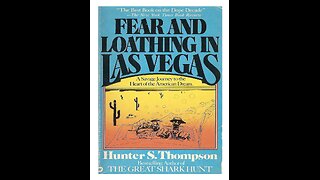 5:04:39
5:04:39
PukeOnABook
26 days agoFear and Loathing in Las Vegas H. S. Thompson, 1971
44 -
 1:32:10
1:32:10
Nikko Ortiz
3 hours agoPainful Life Experiences
17.2K7 -
 1:42:16
1:42:16
Dear America
4 hours agoThe Left Chooses TRANS Over Christianity!! WOKE Mayor Is Doubling Down!!
88.1K54 -
 LIVE
LIVE
Caleb Hammer
2 hours agoGaslighting. Toxic. B*tch. | Financial Audit
99 watching -
 LIVE
LIVE
Viss
2 hours ago🔴LIVE - Positioning, Tactics, Strategy How To PUBG! - PUBG 101
102 watching -
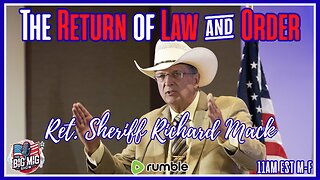 1:02:04
1:02:04
The Big Mig™
4 hours agoThe Return Of Law & Order w/ Sheriff Mack
5.18K6 -
 LIVE
LIVE
Major League Fishing
7 days agoLIVE! - Fishing Clash Team Series: Challenge Cup - Day 6
189 watching -
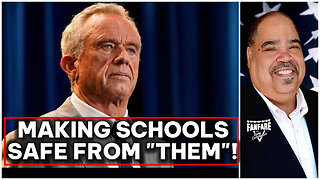 46:02
46:02
Barry Cunningham
18 hours agoWhat Are They Not Telling Us About These Drugs?
8.02K3 -
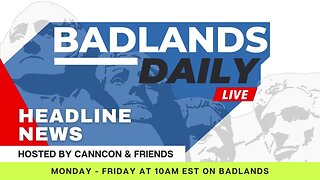 1:49:51
1:49:51
Badlands Media
11 hours agoBadlands Daily: August 29, 2025
24.5K9 -
 39:49
39:49
Randi Hipper
2 hours agoBITCOIN BULL MARKET ENDING EARLY? PRICE UPDATE
7.38K1